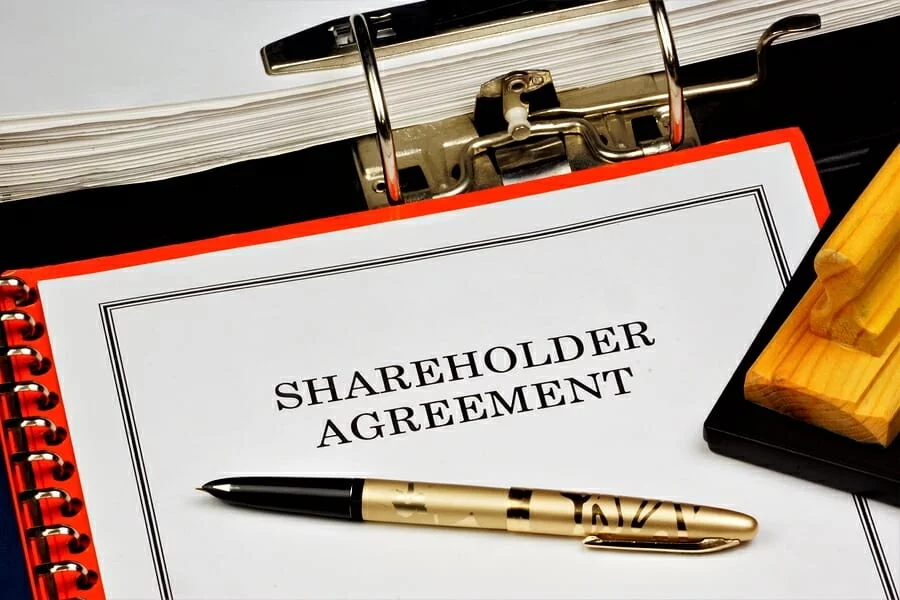A stockholders agreement (or shareholders agreement) ensures the smooth running of the business by clarifying decision-making processes, ownership transfers, and resolving disputes. This guide will help you understand the key points of a shareholders agreement and why it’s important for your business.
What Is A Stockholders Agreement?
A stockholders agreement is a contract between the company’s shareholders that complements the company’s articles of association. While the Articles set out the basic rules, the stockholders agreement goes further and deals with potential conflicts and sets out specific shareholder rights. This includes:
- Share distribution and transfer restrictions
- Voting rights and decision-making processes
- Dividends and financial entitlements
- Conflict resolution mechanisms
- Exit strategies for shareholders
Why A Stockholders Agreement?
Protect Minority Shareholders
A good shareholders agreement ensures that minority shareholders’ rights are protected and that all shareholders agree on important decisions. A tailored shareholders agreement will outline these provisions clearly.
Prevent Disputes
Clear terms on governance, share transfers, and voting rights reduce confusion and help prevent shareholder disputes. When the agreement is in place, everyone knows their responsibilities, which helps prevent conflicts among shareholders.
Business Continuity
Having provisions for shareholder exits, director appointments, and deadlock resolution ensures the company can continue to operate smoothly in unexpected situations. This helps protect shareholders’ interests and ensures company operations are not disrupted.
Stockholders Agreement Provisions
Parties
List the company shareholders, their shareholdings, and any initial capital contributions. This ensures that all parties involved are clearly defined, including the company’s shareholders and their respective roles.
Management and Decision Making
Define voting rights and how decisions will be made, especially for major decisions like mergers, acquisitions, or the addition of new shareholders. This ensures the consent of all shareholders is obtained for significant business moves.
Ownership and Share Transfers
Set out rules for share transfers, including pre-emption rights, buy-back options, and restrictions on selling shares to other shareholders or third parties. This protects the company’s ownership structure, safeguarding existing shareholders from unwanted ownership changes.
Dividend Policy
Specify how profits will be distributed and whether they’ll be reinvested into the company. This clarity will help all shareholders understand their financial entitlements.
Minority and Majority Shareholder Protections
Include drag-along clauses (where majority shareholders can force others to sell) and tag-along clauses (which protect minority shareholders in a sale). This ensures all shareholders are treated fairly in the event of major decisions affecting company direction.
Confidentiality and Restrictive Covenants
Protect the company’s intellectual property and prevent shareholders from starting competing businesses. This confidentiality obligation is important to ensure that sensitive company information remains secure.
Dispute Resolution
Specify how disputes will be resolved—through mediation, arbitration, or buy-out options. These mechanisms help resolve shareholder disputes quickly and cost-effectively, avoiding lengthy litigation.
Exit Strategies
Plan for scenarios like a shareholder leaving, bankruptcy, or retirement. Specify how shares will be valued and bought back in these situations to protect remaining shareholders. This is particularly important in a new business or when existing shareholders are concerned about future disputes.
When to Create a Stockholders Agreement
Create a stockholders agreement:
- At the beginning of the company so clear guidelines are in place from day one.
- When new shareholders join so everyone knows their role and responsibilities.
- Before any big investment or business milestone, like raising funds or merging with another company.
Delaying drafting may lead to misunderstandings and shareholder disputes, which can harm the company’s future direction.
How to Create a Stockholders Agreement
Get Legal Advice
It’s always best to have a solicitor draft the agreement for your company. A well-drafted shareholders agreement ensures that all shareholders agree on the same terms, making it legally binding and tailored to your business.
Add Custom Provisions
Think about your business’s needs. For example, if your company has valuable intellectual property, include provisions to protect it. A tailored shareholders agreement will ensure that your company’s unique needs are addressed.
Consistency with Articles of Association
If there’s a conflict between the shareholders agreement and the company’s articles of association, the Articles will usually prevail unless the agreement has a supremacy clause. This clause can make the shareholders agreement override the Articles in certain cases.
Stockholders Agreement FAQs
Do I need a stockholders agreement for my business?
No, it’s not compulsory, but it prevents disputes and protects all shareholders’ rights. It’s highly recommended for any company with multiple shareholders.
Can I create my own stockholders agreement?
Yes, but it’s advisable to get legal advice to make sure the agreement covers everything, including complicated issues like shareholder loans or voting rights.
Does a stockholders agreement override the Articles of Association?
Generally, the Articles will prevail unless there’s a supremacy clause in the agreement. This clause allows the shareholders agreement to override the Articles in specific situations.
What happens if there’s no stockholders agreement?
If there’s no agreement, the company defaults to the Companies Act 2006 and its Articles of Association. These may not address specific shareholder concerns or protect minority shareholders effectively.
How much does it cost to create a stockholders agreement?
Costs vary, but typically range from £500 to £2,000 for a well-drafted agreement, depending on your company’s specific requirements.
Conclusion
A stockholders agreement is crucial for protecting all shareholders and ensuring smooth business operations. Having a comprehensive shareholders agreement in place, which includes provisions for company capital contributions and shareholders consent, ensures the company’s ownership structure is secure. Whether you’re drafting your own shareholders agreement or updating an existing one, seeking professional legal assistance ensures your agreement is tailored to your company’s needs. It will cover potential future scenarios and address both existing shareholders and new shareholders, ensuring clarity and fairness.

